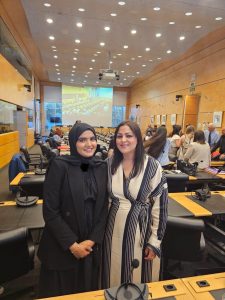The Race Equality Network (REN), a Bradford-based charity, has made a significant impact on the global stage by presenting a powerful report on racial inequality in the United Kingdom to the United Nations Committee on the Elimination of Racial Discrimination (CERD). The presentation took place in Geneva during the committee’s 113th session from 12 – 14 August, led by REN’s Executive Director Humma Nizami and Projects & Communications Officer Fatima Mahmood.
The report reveals that much of the UK’s legislation and policies related to race equality are in breach of several key articles of the International Convention for the Elimination of Racial Discrimination (ICERD). As a strategic leader for over 80 ethnically diverse grassroots organizations within Bradford, REN is committed to eradicating the root causes of racism within public, private, and voluntary sectors.
As well as feeding into the report co-produced by Runnymede Trust and Amnesty International UK through a roundtable event attended by over 20 member organisations which focused on worsening racial disparities, REN produced a report that aims to highlight a variety of issues at addressing racial inequalities and provides recommendations to the UK Government based on the work carried out by REN and wider research.

Humma Nizami, in her statement to the UN, emphasised the lived experiences of racism faced by Global Majority communities in Bradford and across the UK, highlighting critical areas such as health disparities, the immigration and asylum system, and civil liberties. Fatima Mahmood provided key interventions on immigration and asylum, presenting specific recommendations on behalf of REN and other civil society organisations present.
Nizami stated, “It was a great honour to meet the UN rapporteurs, committee members, and all the civil society organisations from the UK who are delivering vital work to combat racism and inequalities faced by people of color. Racial discrimination and racial injustice are often baked into the structures of institutions and have been left unchallenged for far too long. If we are to challenge institutionalized racism, we must look beyond individual acts of prejudice and focus on the systemic barriers built into policies, practices, and structures.”
Reflecting on the recent far-right riots in the UK and the surge in Islamophobia and anti-migrant sentiment, Nizami added, “At REN, we are more committed than ever to working collaboratively with our members and institutions to eliminate all forms of racism from our communities. Now is the time for the UK government to invest in how we achieve this.”
Mahmood echoed these sentiments, stating, “In the current political climate, the work of the Race Equality Network and other civil society organisations is crucial now, more than ever. We look forward to collaborating on a range of issues, such as health inequalities and civil liberties, to build a world grounded in hope, justice, and solidarity.”
REN Chair Yusuf Karolia remarked, “REN has been challenging racism and inequalities for almost 25 years with our focus firmly on rooting out racism at all levels of society and across all institutions. Racial disparities are avoidable, and by incorporating racial equity into operations and service delivery, the UK can not only improve the quality of its services but also more effectively eliminate racism.”
The full report is available to read on Race Equality Network’s website:
Addressing Racial Inequality in the UK: A Call for Change from the Race Equality Network at the United Nations.




